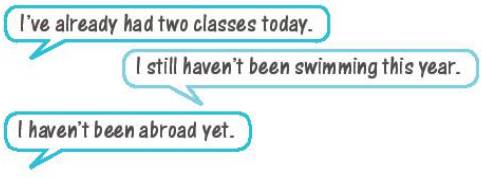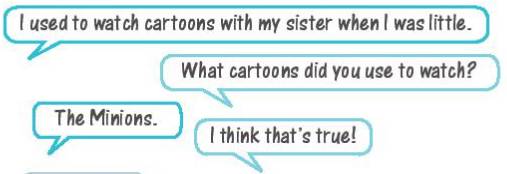Hãy nhập câu hỏi của bạn vào đây, nếu là tài khoản VIP, bạn sẽ được ưu tiên trả lời.

I.
1. friendlier
2. longer
II.
1. Your house is shorter than my house.
2. I listening to music.
3. The white one is cheaper than the black one.
4. We used to use oil lamps.
5. Mary is the most intelligent in my group.

Tham khảo
Today:
- I have already had breakfast this morning.
- I haven't finished my work yet.
- I still haven’t gone for a run.
This year:
- I have already visited four different countries.
- I haven't learned a new language yet.
- I still haven’t found a new job.
In my life:
- I have already graduated from university.
- I haven't traveled to South America yet.
- I still haven’t learned how to play the piano.
Tham khảo
Today:
- I have already had breakfast this morning.
- I haven't finished my work yet.
- I still haven’t gone for a run.
This year:
- I have already visited four different countries.
- I haven't learned a new language yet.
- I still haven’t found a new job.
In my life:
- I have already graduated from university.
- I haven't traveled to South America yet.
- I still haven’t learned how to play the piano.

1. We have never seen that film.
2. The explorer has never been in a dangerous situation
3. I have never gone to America.
4. My parents have never sailed on an ocean.
5. Toby has never gotten lost.
6. Lara and Holly have never used a camcorder
7. You have never seen a dinosaur
8. We have never lost our homework
9. Grandma and grandpa have never sent an email.
Chúc bạn học tốt!!!
1.never see
2.is never
3. never go
4. ????
Còn lại thì tự làm nhé

D. WRITING I. Use the adjectives in brackets in their correct forms of comparison to complete the sentences. (1,0pt)
1/ Some people think that country folk are ……………more friendly……………………. than city people. ( friendly)
chắc vại :3
hc tốt

1. I used to be a monitor when I was in 5th grade.
(Tôi từng là một lớp trưởng khi tôi còn học lớp 5.)
2. I didn’t use to be interested in comics.
(Tôi từng không thích truyện tranh.)
3. I used to cry when I was a child.
(Tôi từng hay khóc khi tôi là một đứa trẻ.)
4. I didn’t use to go to school by bike.
(Tôi từng không đến trường bằng xe đạp.)
5. I used to have short hair when was little.
(Tôi từng có mái tóc ngắn khi còn nhỏ.)
6. I didn’t use to like music.
(Tôi từng không thích âm nhạc.)
7. I used to play badminton with my friends after school.
(Tôi từng hay chơi cầu lông với bạn bè sau giờ học.)
8. I used to watch movies in the evening.
(Tôi từng xem các bộ phim vào buổi tối.)
***
A: I used to play sports with my brother when I was little.
(Tớ từng chơi thể thao với anh trai khi tớ còn nhỏ.)
B: What sports did you to play?
(Cậu đã từng chơi môn thể thao nào?)
A: Badminton.
(Cầu lông.)
B: I think that's false!
(Tớ nghĩ điều đó là sai!)

Exercise 1. Underline the most suitable future form in each sentences.
Why are you going to buy / will you buy a new mountain bike?
Don’t phone between 8.00 and 9.00. I’ll study / I’ll been studying then.
Look out! That tree will / is going to fall.
Let me know as soon as Louis will get / gets here.
Great news! Jean and Chris will come/ are coming to stay with us.
According to this timetable, the bus is going to arrive/ arrives at 6.00.
Can you call me at this evening, because I’ll / I’m leaving tomorrow.
If you arrive late at the sale, the best thing will go / will have gone.
Exercise 2. Put each verb in brackets into a suitable future form.
By the time we reach home, the rain will have stopped (stop).
This time next week I (lie) will be lying on the beach in Spain.
In ten years’ time I (work). will be working for a different company.
If we don’t get there by 6.00, Jack (leave) will leave
In July they (be married). will have been married for 20 years.
In the year 2500 a lot of people (live) will be living on the Moon.
When you get to the station, I (wait) will be waiting for you outside.
Don’t worried! The plane (land) will be landing/ will land/ is going to land in a moment.
By the time you come home, I (finish) will have finished. the decorating.
Come round between 8 and 9. We (watch). will be watching the match on TV then.
Exercise 3. Put each verb in brackets into a suitable future form.
When I (see) see you tomorrow, I (tell) will tell you my news.
As soon as we (get) get there, we (phone) will phone for a taxi.
I (go) will go to the library before I (do) do the shopping.
We (wait) will wait here until the rain (stop) stops
I (get) will get. £50 from the bank when it (open) open
After you (take) take the medicine, you (feel) will feel better.
You have to stay until you (finish) have finished your work.
I (let) will let you know the minute I (hear) hear the results.
Before we (paint) paint the wall, we (have).will have a cup of tea.
We (climb) will climb over the wall as soon as it (get) gets dark.
Exercise 4. Put each verb in brackets into a suitable future form.
Have you ever wondered what exactly (1) you will be doing (you do) in ten years time? Well, according to the computer expert Tom Vincent, computer (2) will be soon able (soon be able) to make accurate predictions about the future. Professor Vincent, from Cambridge,(3) will hold (hold) a press conference next week to describe the computer which he calls “the Computafuture”. “This computer can tell us what life(4) will be (be) , based on data describing last events”, explains Professor Vincent. For example, Computafuture can predict how many people(5) will live (live) in a parular area, or whether there(6) will be (be) a lot of rain during a parular period. Professor Vincent also believes that by the year 2050, computer (7) will have replaced (replace) teachers, and (8) will also be doing (also do) most of the jobs now being done by the police. “Computer are becoming intelligent all the time”, says Professor Vincent. Soon they (9) will be directing .(direct) traffic and(10) teaching (teach) our children. And telling us about the future.”

V. Complete the passage with the appropriate words connected with the subjects of computer.
A computer has a (1)_keyboard_ similar to that of the typewriter. The machine has a (2)socket at the back so that you can connect it to a (3)monitor which has a (4)screen like a television. We often use a (5)program which someone has written . All the information is stored on (6)disk, and at the side of the computer there is a (7)mouse. A (8) printer is used to copy the information onto paper.


1: still
2: already
3: yet
1. still
2. already
3. yet